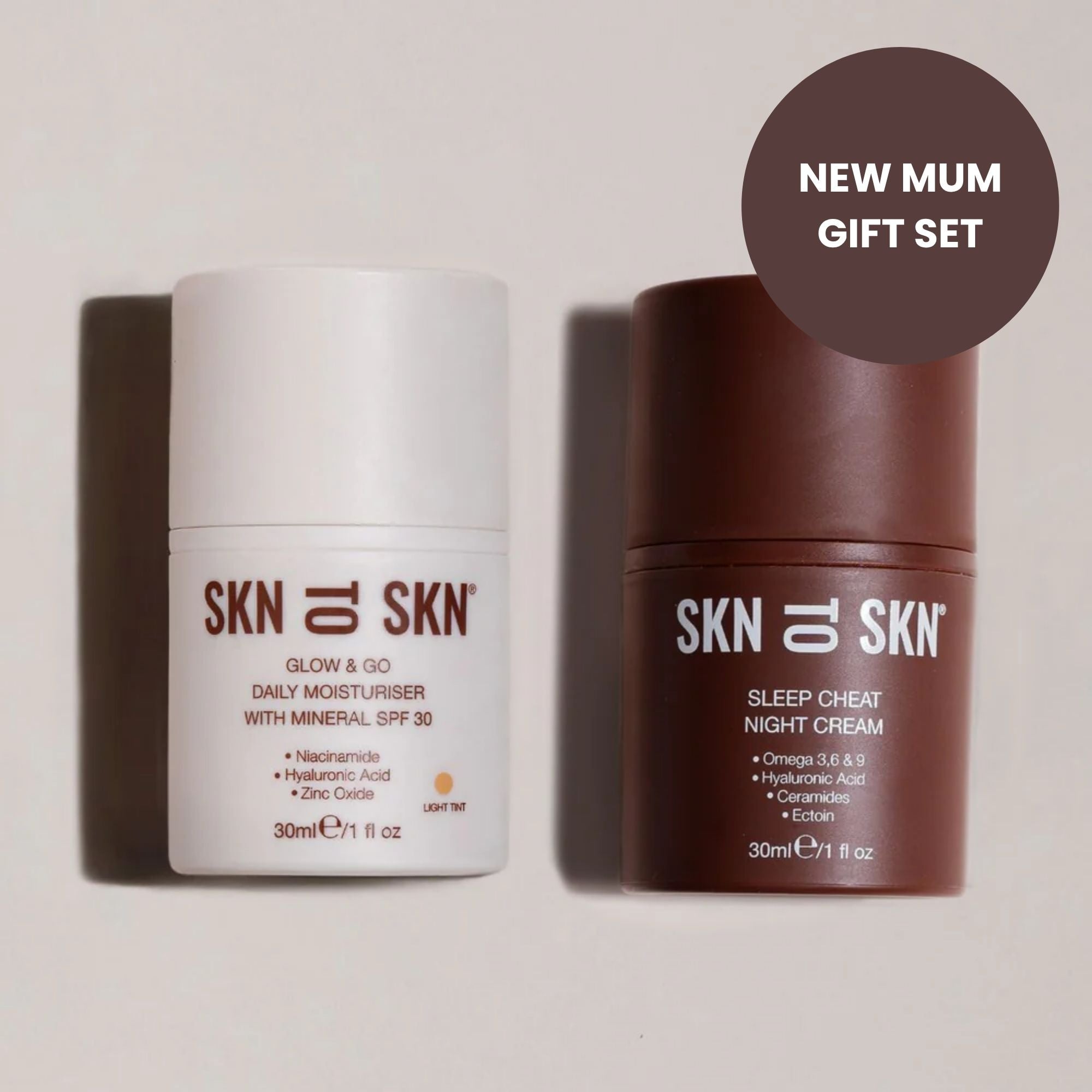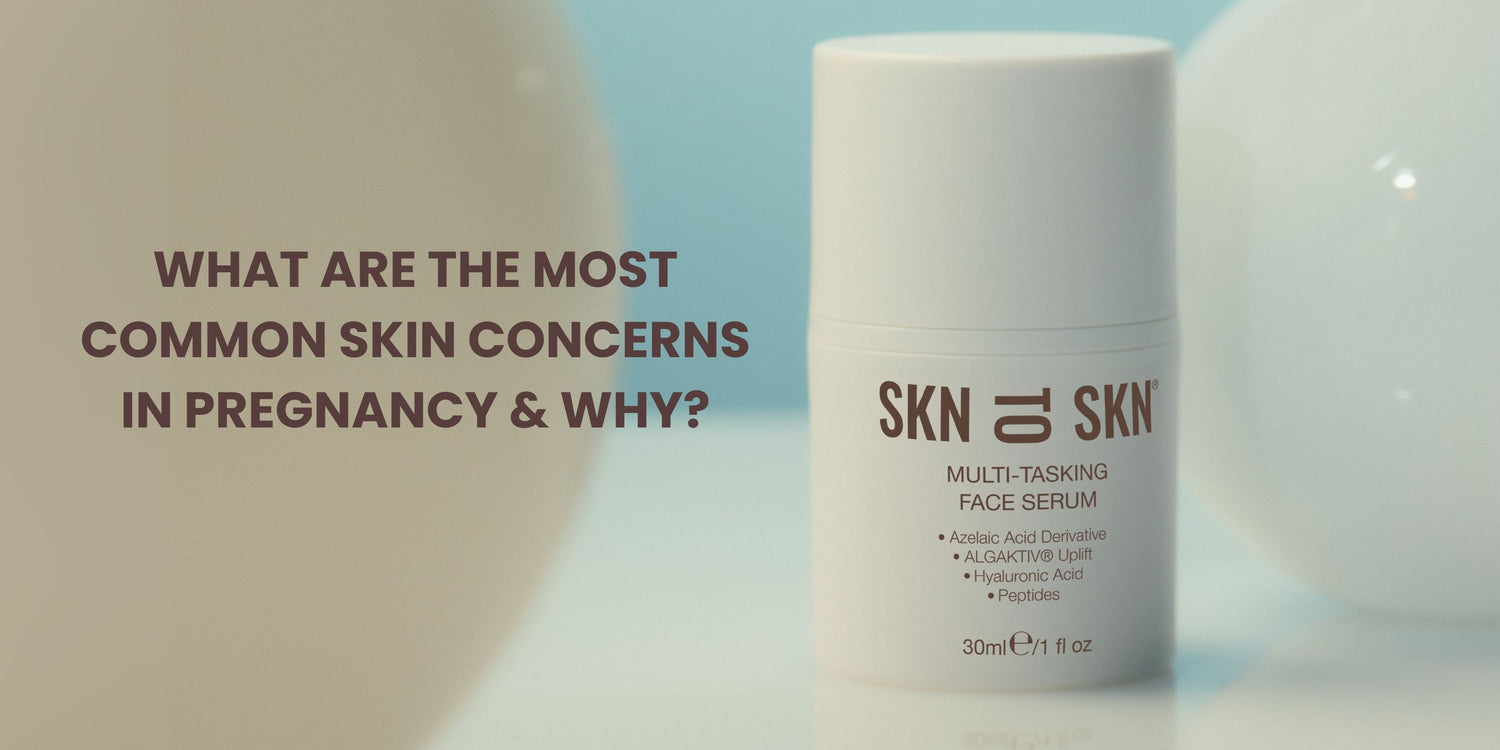Pregnancy is an exciting journey but it brings about a host of physical changes in the body, and the skin is no exception. While some experience a radiant “pregnancy glow”, others may experience unexpected and frustrating skin concerns and changes. These changes are largely driven by hormonal levels fluctuations, increased blood volume, and the physical demands of pregnancy as the body adapts to support new life. Understanding the most common skin concerns during pregnancy and their causes can help you manage them effectively and feel confident in your skin throughout this beautiful journey.
Acne Breakouts
Why It Happens: Hormonal changes, particularly an increase in progesterone, can stimulate the skin's oil glands, leading to excess sebum production. This can clog pores and result in breakouts, often appearing on the face, chest, and back, or worsen pre-existing acne.
How can I fix my pregnancy acne?
To manage pregnancy acne, stick to gentle, pregnancy-safe cleansers and skincare products, such as those containing azelaic acid or niacinamide, to help manage breakouts without harming your baby. Avoid retinoids and high concentrations of salicyclic acid.

Hyperpigmentation (Melasma)
Why It Happens: Increased levels of estrogen and progesterone can trigger an overproduction of melanin, leading to dark patches, commonly known as the "pregnancy mask" or melasma. This usually appears on the forehead, cheeks, and upper lip. UV exposure and even exposure to high intensity visible lights (computer screens and bright lights) can exacerbate these changes.
How to remove pigmentation during pregnancy
Protect your skin with a broad-spectrum mineral sunscreen containing zinc oxide or titanium dioxide- a tinted SPF containing iron oxide will also help to protect against pigmentation caused by visible light. Consider using pregnancy-safe gentle brightening agents like vitamin C and niacinamide. Avoid direct sun exposure and wear a wide-brimmed hat when outdoors.

Stretch Marks
Why It Happens: As the skin stretches rapidly to accommodate a growing baby, the underlying connective tissue can tear, leading to stretch marks, especially on the abdomen, hips, breasts and thighs. Genetics also play a role in determining their severity.
How to avoid stretch marks in pregnancy
It is important to note that no treatment can completely prevent stretch marks. Regularly moisturise with products rich in ingredients like ceramides and hyaluronic acid to keep the skin supple and minimise the appearance of stretch marks. Wearing maternity support garments to reduce skin tension can also help, especially around the belly and breasts. After delivery, topical retinoids, laser and radiofrequency treatments can help improve the appearance of stretch marks.

Dry and Itchy Skin
Why It Happens: Hormonal shifts and stretching of the skin can disrupt the skin's natural barrier, leading to moisture loss and dry, itchy skin. Some women may develop more severe conditions like pruritic urticarial papules and plaques of pregnancy (PUPPP, also known as polymorphic eruption of pregnancy). This usually develops during the third trimester of pregnancy, often in the last 4–6 weeks. It is most common in first-time pregnancies and when the skin stretches rapidly, such as in cases of multiple pregnancies (e.g., twins or triplets) or significant weight gain. It typically starts on the abdomen, especially around stretch marks, and can spread to the thighs, buttocks, and arms).
How can I fix dry skin during pregnancy?
Hydrate your skin with gentle, fragrance-free moisturisers that contain ceramides and hyaluronic acid and avoid hot showers, which can strip the skin of natural oils. If itching is severe or if there is a rash, consult your doctor to rule out more serious conditions.
Increased Sensitivity - why does my skin feel like it's burning while pregnant?
Why It Happens: The hormonal rollercoaster during pregnancy can make the skin more reactive to external factors, such as weather changes, skincare products, and even fabrics.
How To Manage: Simplify your skincare routine and opt for hypoallergenic, fragrance-free products to minimise irritation.

Spider Veins and Varicose Veins
Why It Happens: Increased blood volume and pressure on veins from the growing uterus can put a strain on veins and disrupt their valves, lead to visible spider veins and varicose veins, often associated with general swelling of the lower legs.
How to avoid getting spider veins: Elevate your legs when resting, wear compression stockings, and stay active to promote healthy circulation. Avoid prolonged periods of sitting or standing.

Skin Tags
Why It Happens: Hormonal changes can lead to the development of small, benign growths known as skin tags, which often appear in areas of friction such as the neck, underarms, and breasts. These are especially common in the second and third trimesters.
Will pregnancy skin tags go away?
Skin tags are harmless and often disappear postpartum, but if they bother you, consult a dermatologist for safe removal options after pregnancy. Avoid picking or pulling at them, as this can cause irritation.

Broken Capillaries and Redness
The increased blood volume and pressure on blood vessels during pregnancy can lead to broken capillaries, especially on the face, as well as general redness or flushing.
How To Manage It: Use gentle skincare products to avoid exacerbating redness and protect your skin from extreme temperatures. Broken capillaries can be treated postpartum with laser therapy if they persist.
Hair and Nail Changes
Why It Happens: Pregnancy hormones can also affect hair and nails. While some experience thicker, glossier hair, others may notice thinning or shedding. Nails may grow faster but become brittle or prone to splitting.
How To Manage It: Maintain a healthy diet. Any excessive hair loss postpartum (telogen effluvium) typically resolves spontaneously within a few months.

Eczema and Psoriasis Fluctuations
Why It Happens: Existing skin conditions like eczema or psoriasis may worsen or improve during pregnancy due to immune system changes.
How To Manage It: Stick to mild, moisturising products and consult your dermatologist for pregnancy-safe treatments to manage flare-ups.

While pregnancy can bring about a variety of skin concerns, understanding their causes and implementing a safe, effective skincare routine can help you manage these changes with confidence. Always consult with your healthcare provider before trying new skincare products to ensure their safety during pregnancy.
At SKN TO SKN, we provide clinically proven, pregnancy-safe skincare solutions to support you through every stage of motherhood.
 Written by Professor Caitriona Ryan, Consultant Dermatologist
Written by Professor Caitriona Ryan, Consultant Dermatologist




